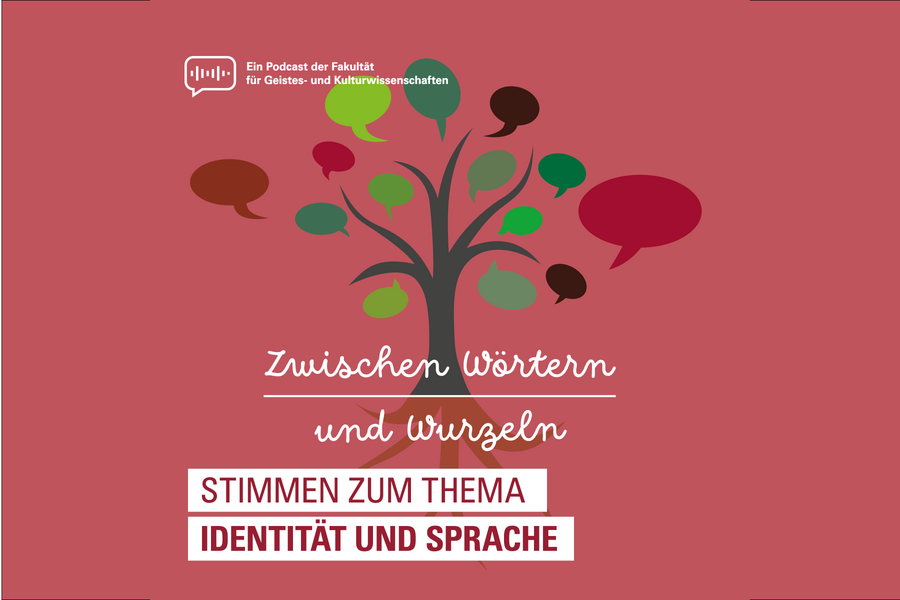End-of-semester project
Students develop podcast on language and identity

"The basic idea was for the students to build up the necessary knowledge and skills to initiate projects such as the development of a podcast in schools," explains Prof Dr Kirsten Schindler. She organised the seminar for students studying for a Master's degree in primary school teaching and special education together with Hanna Hauch from the Digitalisation in Teaching Network (BU:NDLE) - a collaboration that Schindler describes as very successful. The content of the course centred on language and identity. "We chose the topic because it has many facets and offers many points of reference for school lessons," says Schindler.
From idea to realisation
In the seminar, the students first focussed on the podcast genre, reflecting on their own preferences and listening habits and learning about key characteristics of the genre between oral and written form. A second focus was then on the topic of language and identity, dealing with linguistic diversity, prestige languages, youth language and other topics that were also taken up or expanded upon in the podcasts.
The students then learnt how to develop a script for a podcast and practised speaking. Once the research, conceptualisation and planning was complete, they went into the podcast booth, which is set up in the Future of Learning Lab at the School of Humanities. They then edited and cut their recording. The final step was the description for Spotify and the Deutschdidaktik Instagram account.
Authentic learning experiences
"We believe that these authentic learning experiences are important for students in the teaching profession and that this also reduces the barriers to realising such projects at school," says Kirsten Schindler. Some of the students will now actually put the knowledge they have gained to the test in their upcoming practical semester and produce a podcast with their pupils.
One of them is Linda Wilke. In this interview, she talks about her personal connection to the topic and the production of the podcast.
What interested you personally about the topic of "language and identity" and why do you think it is relevant in a school context?
Due to my family background and my previous experiences, I have a personal connection to the topic of language and identity. I see this topic as particularly relevant today for people who have grown up multilingual, but also for people who have not. Tolerance and education are particularly necessary in schools.
What aspects of language and identity does your podcast episode highlight and why did you choose this particular focus?
My group produced the episode "Language as prestige - between pride and prejudice." produced. This episode is about the multilingual upbringing of a fellow student and myself. We talk about our family backgrounds and explain why it is sometimes difficult to grow up multilingual. We chose this personal focus because we have noticed in our work in schools that there are still prejudices about multilingualism among pupils and teachers. With our episode, we want to highlight the many advantages of growing up multilingual and appeal for more tolerance and joy in dealing with migration and multilingualism.
How did you and your group proceed with the development - from finding the topic to realising it?
We had to think directly about our own biographies with the broad theme of "language and identity". Because my group already knew each other, we knew about our different and sometimes unusual stories of origin. These differ in some respects, which is why we decided to juxtapose two family stories. Our episode is therefore an interview consisting of three people. Once we had agreed on our topic and the rough content, we developed possible interview questions that the moderators of our teams could ask us in turn during the episode. We rehearsed our process before recording, but then recorded it straight away. We didn't want to lose the personal and open character of the interview.
What challenges did you face when creating the podcast and how did you overcome them?
One of the main challenges was the recording. We recorded the episode with professional equipment that picked up every little noise. We therefore had to record in the recording booth in a very quiet and focussed manner. We also had to make sure that we didn't just read out the notes from our script, but that we spoke freely and openly. It is particularly important for our type of podcast that we spoke freely and authentically.
What potential do you see in integrating such projects into school lessons?
I will be using the technical and didactic skills I learnt next spring to produce my own podcast with an inclusive primary school class. The seminar provided me with the necessary basics and inspired me to implement the podcast medium with pupils in grades three and four. I will also be writing my master's thesis with Professor Schindler on the implementation and possible support potential. I see just as much potential in the classroom as I do in university implementation. Especially for pupils with special educational needs or with German as a second language, the production or reception of podcasts in the classroom could be a great benefit. I'm excited to see how this will work with my primary school pupils!
Between words and roots
A total of nine episodes have been produced in groups of three. Among other things, they deal with how youthful words shape our language, the pitfalls of machine translations and the fascinating world of multilingualism.
The podcast can be accessed via Spotify.
